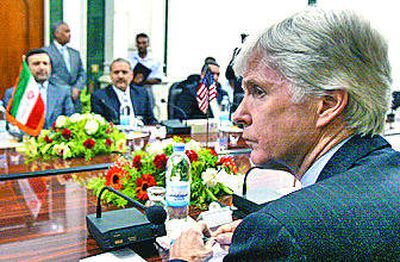U.S., Iranian ambassadors upbeat after historic sit-down

BAGHDAD – The United States and Iran held their first official high-level, face-to-face talks in almost 30 years on Monday to discuss the deteriorating security situation in Iraq, and officials emerged generally upbeat about the renewed dialogue, suggesting additional meetings were likely.
In briefings to reporters afterward, the chief negotiators – U.S. Ambassador to Iraq Ryan C. Crocker and Iran’s ambassador to Baghdad, Hassan Kazemi Qomi – said the talks focused solely on Iraq and did not address Iran’s nuclear program or the recent detentions of Iranian-American citizens by Tehran.
Underscoring the crux of the security problem here, a suicide bomber detonated a truck loaded with explosives at one of Iraq’s most revered Sunni shrines, the Abdul Qadir al-Gailani mosque, in central Baghdad shortly before talks concluded. The blast killed at least 19 people and wounded 69, raising fears of a retaliatory cycle of sectarian bloodshed similar to what happened last year when a Shiite shrine was bombed in Samarra. More than 1,000 people were killed in sectarian violence following the Samarra mosque attack in February 2006.
“This mosque for centuries has been a refuge for all Iraqis – here we call for the unity of the people and brotherhood,” the mosque’s imam, Mahmoud Essawi, said after Monday’s blast. “I’m calling on Iraqis not to be drawn into the strife.” It was the deadliest attack in a day in which more 75 people were killed across the country by mortar strikes, roadside bombs, suicide attacks and other violence.
Monday’s four-hour meeting between the U.S. and Iran diplomats yielded no breakthroughs, but the comments by Crocker and Qomi suggested that the two countries shared surprisingly similar assessments of the security problems facing Iraq, if not the causes. Both men characterized the meeting as positive.
“The two sides dealt with the issues in a very frank and transparent and clear way,” Qomi said at the Iranian Embassy in Baghdad. “The views of both sides were unified and identical on the question of the security issue.”
Crocker said, “There was pretty good congruence right down the line – support for a secure, stable, democratic, federal Iraq, in control of its own security, at peace with its neighbors.” But then the two sides parted ways, he said.
“This is about actions, not just principles, and I laid out to the Iranians direct, specific concerns about their behavior in Iraq and their support for militias that are fighting Iraqi and coalition forces,” he said. Crocker said he did not present a dossier of evidence, but impressed upon his Iranian counterpart that the United States was “looking for results” and wanted “a change in Iranian behavior.”
He said Qomi did not respond.
At his news conference, Qomi said allegations that Iran is supplying insurgents with weapons, munitions and training have been denied by Iran on numerous occasions and “don’t prove anything.”
In what may be one of the more significant ideas raised at the meeting, Qomi said that Iran had proposed creating a special security committee of Iranian, U.S. and Iraqi officials to deal with all U.S. allegations about Iranian activities in Iraq. Such a committee also could offer a framework for future meetings, Qomi said.
Crocker, who is from Spokane Valley, said he would forward the proposal to Washington.
“Their main focus was on the mechanisms, if you will, and principles, rather than the detailed security substance that we need to see improvement on,” Crocker said.
Both sides said the talks were instigated by Iraq’s prime minister, Nouri al-Maliki, and were held in his office. Maliki welcomed the ambassadors, who shook hands, and then escorted them into a conference room. The prime minister did not attend the meeting; Iraq was represented at the session by national security adviser Mowaffak al-Rubaie.